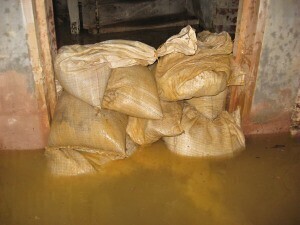Wateroverlast Profburgwijk / Water Nuisance Profburgwijk
02.10.2024 : Oproep tot deelname werkgroep - Eind 2023 kwam er een melding binnen bij het bestuur van de wijkvereniging dat de poort achter huizen in de Kapteynstraat blank stond. Namens het bestuur heeft Thea Dickhoff uitgezocht wie hierop aangesproken zou kunnen worden. Het bleek dat mensen dit zelf moeten oplossen. Dat heeft Thea in april gemeld, met wat suggesties voor gezamenlijke aanpak met buren.English follows the Dutch text
Bij de ALV kwam het onderwerp terug in de vorm van vocht in kruipruimten. De vraag was en is wie hierop aanspreekbaar is vanuit de overheid. De bewoners zelf meldden van kast naar muur gestuurd te worden.
Bij een bijeenkomst van het Ouderencontact over het Hoogheemraadschap bleek het volgende:
Het grondwaterpeil daalt door droogte, waardoor scheuren ontstaan in de bodem. Bij veel regen komt daardoor wateroverlast voor. De bodem neemt niet goed meer op en dat wordt versterkt door verstening. Bij extreem droog weer zou het grondwaterpeil omhoog moeten, om verzakking van funderingen te voorkomen. Het hoogheemraadschap is hier ook niet voor verantwoordelijk, dat is aan de provincie. Het hoogheemraadschap is wel in overleg met de provincie over iets meer flexibiliteit hierin.
Het hoogheemraadschap overlegt met de gemeente over o.a. riolering en wateroverlast. Maar is niet verantwoordelijk voor het rioleringssysteem.
Het streven is hemelwater zoveel mogelijk af te koppelen van de normale riolering en het rechtstreeks naar het open water te sluizen. Daarmee zou het probleem grotendeels verholpen kunnen worden. De gemeente moet zorgen voor een apart riool stelsel hiervoor.
Een mogelijkheid daartoe is het aanleggen van zgn. DIT riolen, waar het regenwater wordt afgekoppeld. Dit kan bij het vervangen van riolering. Dat is in onze wijk niet gebeurd bij het vervangen van de rioleringen tot nu toe.
Er is een platform Slappe bodem, dat werkt aan bewustwording/agendering van bodemdaling. Gemeenten ondersteunen elkaar in overleg over het onderwerp en wisselen informatie uit over uitgevoerde projecten. Zoals het aanbrengen van filterputten en het ophogen van kruipruimten. Leiden neemt niet deel aan dit platform.
Dit is een onderwerp dat nogal wat kennis vraagt en tijd om in overleg met de gemeente te gaan. Het bestuur heeft besloten te proberen hier een werkgroep met bewoners voor te formeren.
Bent u geïnteresseerd in dit onderwerp, of belanghebbende en heeft u tijd om dingen nader uit te zoeken en te overleggen met de gemeente?
Meldt u zich dan bij mij aan: tcdickhoff@yahoo.com
Namens het bestuur
Thea Dickhoff
Water Nuisance : Call for participation in working group
At the end of 2023, a report was received by the board of the neighborhood association that the access path behind houses in Kapteynstraat was flooded. On behalf of the board, Thea Dickhoff investigated who could be held accountable for this. It turned out that people have to solve this themselves. Thea reported this in April, with some suggestions for a joint approach with neighbors.
At the AGM, the subject came back in the form of moisture in crawl spaces. The question was and is who can be held accountable for this from the government. The residents themselves reported being sent from pillar to post.
At a meeting of the organisation Ouderencontact (elderly contact) about the Water Board, the following emerged:
The groundwater level is falling due to drought, causing cracks in the soil. This causes flooding when there is a lot of rain. The soil no longer absorbs well and this is exacerbated by petrification. In extremely dry weather, the groundwater level should be raised to prevent foundations from subsiding. The Water Board is also not responsible for this, that is up to the province. The water board is in consultation with the province about a little more flexibility in this.
The water board consults with the municipality about, among other things, sewerage and flooding. But is not responsible for the sewerage system.
The aim is to disconnect rainwater as much as possible from the normal sewer system and to channel it directly to open water. This would largely solve the problem. The municipality must provide a separate sewer system for this.
One option for this is to install so-called DIT sewers, where the rainwater flow is disconnected. This can be done when replacing the sewers. This has not happened in our district when replacing the sewers so far.
There is a Soft Soil (Slappe bodem) platform, which works on raising awareness/agenda of soil subsidence. Municipalities support each other in consultation on the subject and exchange information about projects that have been carried out. Such as installing filter wells and raising crawl spaces. Leiden does not participate in this platform.
This is a subject that requires quite a bit of knowledge and time to discuss with the municipality. The neighborhood association board has decided to try to form a working group with residents for this.
Are you interested in this subject, or are you an interested party and do you have time to investigate things further and discuss with the municipality?
Please register with me: tcdickhoff@yahoo.com
On behalf of the board
Thea Dickhoff
